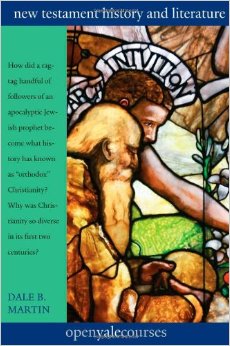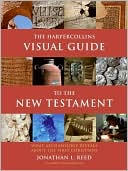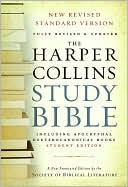|
|
|
Course DescriptionIn
this course we will be exploring the earliest development of
Christianity, using as our primary resource the documents that
eventually comprised the New Testament. Because the New Testament
represents only one particular stream (or streams) of the earliest
Christian era, we will also be looking at archaeology, non-Christian
sources, and Christian texts that were not included in the New
Testament canon. We will also be considering the ways that the New
Testament and its remains have been marshaled in the modern period in
various political, religious, and cultural debates. No prior knowledge
of the Bible, Christianity, or the ancient Mediterranean is required. Course MaterialsThe following books are required for this course and can be found at Huntley bookstore (but you may also buy them online):
Dale B. Martin, New Tesatment History and Literature (New Haven: Yale University Press, 2012). A narrative introduction to the major texts and themes of the New Testament, use these readings as background. [Martin] *Want to see Martin's original lectures on which these chapters were based? Click here!*
Jonathan Reed, The HarperCollins Visual Guide to the New
Testament: What Archaeology Reveals about the First Christians. San
Francisco: HarperOne, 2007. [VisGuide]
Guide to the material culture that informs the New Testament period: be
sure to read the pictures and captions as well as the text!
Harold Attridge, ed., The
HarperCollins Study Bible: Student Edition,
revd. ed. San Francisco: HarperOne, 2006. [Readings listed by biblical
book and chapter] If you would prefer to use your own Bible, please
check with the professor to ensure your translation is appropriate for
class.
Additional readings can be found on electronic reserve through Sakai and linked directly from the syllabus page of this website. Course RequirementsYou are not expected to have prior religious studies or biblical studies experience. You are, however, expected to have proficient reading, writing, and critical thinking skills. Please be familiar with all requirements and expectations as listed below, including the readings required in the reading schedule.
All written assignments (apart from the in-class midterm) will be turned in to the DropBox on Sakai. Note all due dates and times for each assignment below. Late papers will only be accepted due to uncontrollable extenuating circumstances. Graded papers will be returned to you via DropBox, as well. Details on formatting and paper prompts may be found on the course website.
Midterm Examination (25%). An in-class examination covering the first half of the course will be given on October 22. The midterm will ask about significant ideas and themes found in the gospels, and also ask you to evaluate different historical and literary methods of interpretation.
Final Examination (30%). A take-home final examination covering all of the semester will be due on the day and time of this course’s scheduled final exam: Thursday, December 18, at 2pm (all final exams should be turned in to the DropBox on Sakai). Student accommodations: Students requiring academic accommodations should contact the
appropriate person in their Dean of Students office in order to
formalize accommodations (be ready to discuss appropriate
accommodations and provide necessary documentation). Accommodations may
not be provided for students who have not registered through their Dean
of Students Office. College accommodations coordinators are: Scripps - Sonia De La Torre-Iniguez, sdelator@scrippscollege.edu CMC - Julia Easley , julia.easley@claremontmckenna.edu
Scripps College's policy on academic honesty: "Cheating and/or plagiarism seriously violate the principles of academic integrity that Scripps College expects its students to uphold. Academic dishonesty is not tolerated at Scripps and may result in suspension or expulsion from the College. (See the current Guide to Student Life, pp. 90-93.)"
|
|
Return to home page |
Image: "The Four Evanglists" from the Book of Kells, ca. 800



